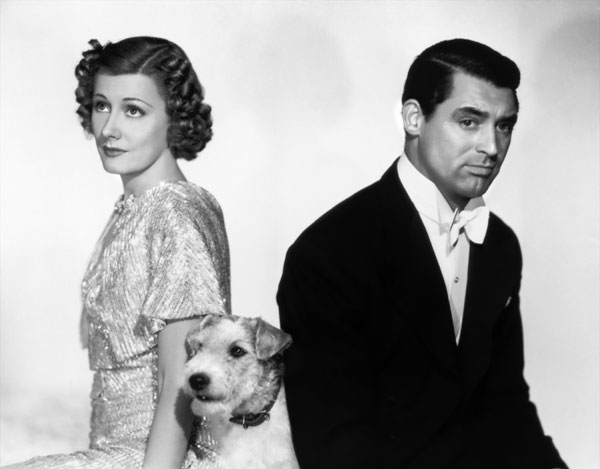Cary Grant and Irene Dunn in The Awful Truth. Photograph courtesy of Columbia Pictures.
As awards season (thankfully) starts to wind down, the AFI ends its annual break from retrospective series—January usually being spent letting folks catch up on the end-of-year prestige films—and begins four new collections of older films, three of which will be with us until early April. Here’s what you can look for at the AFI in the coming weeks, all starting this weekend:
Screen Valentines: Great Movie Romances: Better for you than a box of chocolates and more enduring than a bunch of flowers, the shortest of the new retrospective series fills the month of February with eight classic romances spanning more than a half-century of cinema. Things get underway tomorrow with Cary Grant and Irene Dunn playing that most romantic of couples, the would-be divorcées, only they’re going to have to last a year apart before they’re granted their walking papers. They’re both desperately trying to find someone to replace the love of their life, but maybe, just maybe, the awful truth of The Awful Truth is that they’re really made for each other. The series also includes probably the best of the bunch, The Lady Eve, on Valentine’s Day itself, and other titles include selections with the Hepburns, Katherine (The African Queen) and Audrey (Two for the Road), as well as more-modern favorites in Dirty Dancing and—for fans of a kinder, gentler Ryan Gosling than is on display in this week’s Blu-ray pick— The Notebook.
Bigger than Life: The Films of Nicholas Ray:
One of the most ahead-of-his-time names in cinema—a maverick independent-thinking auteur at a time when Hollywood wasn’t quite ready to release its grip on the notion that directors weren’t just others on the long list of talent-for-hire who made movies—Nicholas Ray would have turned 100 years old last year. In celebration, this series has an impressive collection of 19 films from a director more commonly (and unfairly) remembered for just a couple of his biggest works. This weekend starts things off with his impressive debut, They Live By Night, a 1949 noir about criminal lovers on the run that heralded great things to come.
The rest of the series includes the expected titles, like In a Lonely Place, starring Bogart, and the James Dean vehicle Rebel Without a Cause, as well as the masterpiece psychological thriller Bigger Than Life starring James Mason. There are lesser-seen, more cultish favorites like the Robert Mitchum rodeo flick The Lusty Men, and the film in which Joan Crawford helps Ray subvert everything you expect from a Western, Johnny Guitar (which is still, criminally, not available on DVD in the US). But that’s still just scratching the surface, as the series goes on to explore Ray’s skewed take on war films, more noirs, and even a biblical epic. The one non-Ray-directed title in the bunch is Don’t Expect Too Much, a documentary directed by Ray’s wife, Susan.
Gene Kelly Centennial Retrospective: Another Hollywood great celebrating a centennial is Gene Kelly, and this series should provide a lighter counterbalance to Ray’s typically heavier fare, with this collection of 14 song-and-dance features starring Kelly’s sure-footed steps. Two of those take the screen in this opening weekend: Cover Girl, in which Kelly tries to convince costar Rita Hayworth’s character to stick with dancing (and him) when supermodel opportunity knocks; and Anchors Aweigh, with Kelly and Frank Sinatra as sailors on shore leave. The rest of the series covers much of his career, from classics like Singin’ in the Rain and Hello Dolly (which he directed), to his rather less prestigious big-screen swan song in the campy disco musical Xanadu.
Charles Dickens in the Cinema: A Bicentennial Retrospective: There’s likely no other writer short of Shakespeare with more film credits to his name; Charles Dickens movie adaptations clock in at upward of 300. In honor of his upcoming 200th birthday on February 7, the AFI has selected seven of the best-loved adaptations. Four of those screen in the next week alone: George Cukor’s W.C. Fields–starring David Copperfield, the 1935 David O. Selznick–produced A Tale of Two Cities, and then two from David Lean— Great Expectations and Oliver Twist—both featuring Alec Guinness in key roles.
All these series begin this weekend at the AFI; visit the website for full schedules.
Victor DeNoble was a behavioral pharmacologist working with the tobacco industry in the 1980s to develop a safer form of nicotine, but in doing so, he also found hard evidence that the substance was addictive, and he ended up blowing the whistle on a secret the industry had tried to keep under wraps for years. Director Charles Evans Jr. spent 15 years filming DeNoble’s story, and promises revelations that even at this point, after so many congressional hearings and studies on the subject, the filmmakers claim were still previously undisclosed before this film. DeNoble and Evans have been in town all week promoting the film, and showed the film on Capitol Hill earlier in the week; they’ll be in attendance for Q&As at a couple of this weekend’s screenings at E Street.
View the trailer. Opens tomorrow at E Street Cinema. Evans, DeNoble, and executive producer Charmaine Parcero will be on hand for Q&As after the 7:40 PM screenings on Friday and Saturday.
You may never have heard of Ti West, but the director is quickly establishing himself as the best horror talent today. West films aren’t the cheap shockfests studios release for a quick buck as horror flicks so often are these days, but are instead a far more thoughtful, more deeply frightening brand of scary movie that’s at once forward-looking and innovative, while informed by the best that the genre has had to offer over the decades. West’s latest tells a good old-fashioned ghost story, in which two desk clerks at a quaint New England hotel ride out the final weekend before the hotel is to close forever by trying to find evidence of its reputed haunting. The director’s last feature, House of the Devil, played with the conventions of the ’80s demonic cult movie and babysitter slasher movie while being smarter and more restrained than its inspirations ever were. Here, West pulls from older forebears, making a classical, graceful haunting story that uses its modern setting and chatty slacker stars to take the film to unexpected places. The film was inspired by West and his crew’s own experience staying at the very hotel where this film takes place while shooting House of the Devil.
View the trailer. Opens tomorrow at West End Cinema.
Yesterday, the Smithsonian’s National Museum of American History opened its newly renovated screening room, now dubbed the Warner Bros. Theater (formerly the Carmichael Auditorium), with a ceremony attended by Clint Eastwood, who received a lifetime achievement award at the ribbon cutting in honor of his six decades of work in film. In celebration of the opening of the new 264-seat theater, which features digital and even 3D projection capabilities, the museum is screening four Warner classics from the 1940s, all featuring Humphrey Bogart, over the weekend. This is a list that really requires no introduction: Casablanca, The Maltese Falcon, The Big Sleep, and The Treasure of the Sierra Madre. If you can only make it out for one of those, I’d go with the last: It’s probably marginally the least talked about of that group of four, but it’s one of John Huston’s best, and watching a grizzled Bogey trade dialogue with Huston’s even-more-grizzled father, Walter, onscreen is always a treat.
View the trailer for Treasure of the Sierra Madre . Friday through Sunday at the National Museum of American History. Check the website for showtimes. Free.
From the same time period as some of those Warner Bros./Bogart classics comes this title from Columbia Pictures, which Orson Welles wrote and directed when he was in need of money to keep cash flow going for a stage production he was working on at the time. As with many Welles projects, the film ran into huge difficulties, with large sections being cut by the studio from the version he handed in. Unfortunately, Welles’s original vision has never been rediscovered, but the one that was released—though lacking a little in coherence, likely due to the missing footage—is still a fascinating work from the end of the ten-year stint Welles spend in Hollywood unsuccessfully trying to fulfill the visionary promise of Citizen Kane. (That lack of success had little to do with Welles himself; he was consistently handcuffed by the studios at every turn, leaving us to wonder what he might have really been capable of in that period with free reign over his work.) The film itself, based on Sherwood King’s pulpy novel If I Die Before I Wake, stars Welles as a sailor who is drawn by a rich blonde bombshell (Rita Hayworth) into a tangled murder plot.
View the trailer. Friday and Saturday nights at midnight at E Street Cinema.
Blu-Ray/DVD Pick of the Week: Drive
The latest exercise in highly stylized violence from Danish director Nicolas Winding Refn may have been nearly shut out of Oscar nominations, apart from a well-deserved nod for its incredibly vital sound editing, but for my money, it’s still the best film of 2011. The plot itself is standard-issue B-movie neo-noir fare—with Ryan Gosling as an unnamed and mysterious stunt driver who moonlights behind the wheel piloting getaway cars for heist artists and falls in love with a beautiful but unattainable woman—but the sheer force of Refn’s formidable directorial will turns it into something else entirely. With impeccably constructed visuals and surrealist flourishes, Refn manages a difficult feat: making an almost self-consciously art-house film that’s still breathlessly exciting even though it has little action and long periods of silence. For a movie about a getaway driver, there’s remarkably little actual driving, and only one of the three car-based set pieces can even be properly described as a chase; yet each one—like the film as a whole—subverts everything you know about the way these sorts of scenes are supposed to go in movies. Drive will still have you nailed to your chair and out of breath long after some of the more wispy confections on this year’s Best Picture roster have long floated out of your consciousness.
Special Features: Four making-of featurettes, and an interview with Refn. View the trailer.
















